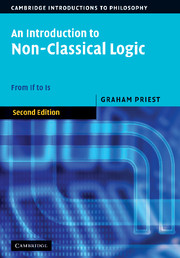Book contents
- Frontmatter
- Contents
- Preface to the First Edition
- Preface to the Second Edition
- Mathematical Prolegomenon
- Part I Propositional Logic
- 1 Classical Logic and the Material Conditional
- 2 Basic Modal Logic
- 3 Normal Modal Logics
- 4 Non-normal Modal Logics; Strict Conditionals
- 5 Conditional Logics
- 6 Intuitionist Logic
- 7 Many-valued Logics
- 8 First Degree Entailment
- 9 Logics with Gaps, Gluts and Worlds
- 10 Relevant Logics
- 11 Fuzzy Logics
- 11a Appendix: Many-valued Modal Logics
- Postscript: An Historical Perspective on Conditionals
- Part II Quantification and Identity
- Postscript: A Methodological Coda
- References
- Index of Names
- Index of Subjects
6 - Intuitionist Logic
Published online by Cambridge University Press: 05 June 2012
- Frontmatter
- Contents
- Preface to the First Edition
- Preface to the Second Edition
- Mathematical Prolegomenon
- Part I Propositional Logic
- 1 Classical Logic and the Material Conditional
- 2 Basic Modal Logic
- 3 Normal Modal Logics
- 4 Non-normal Modal Logics; Strict Conditionals
- 5 Conditional Logics
- 6 Intuitionist Logic
- 7 Many-valued Logics
- 8 First Degree Entailment
- 9 Logics with Gaps, Gluts and Worlds
- 10 Relevant Logics
- 11 Fuzzy Logics
- 11a Appendix: Many-valued Modal Logics
- Postscript: An Historical Perspective on Conditionals
- Part II Quantification and Identity
- Postscript: A Methodological Coda
- References
- Index of Names
- Index of Subjects
Summary
Introduction
6.1.1 In this chapter, we look at another logic that has a natural possibleworld semantics: intuitionist logic, a logic that arose originally out of certain views in the philosophy of mathematics called intuitionism.
6.1.2 We will also look briefly at the philosophical foundations of intuitionism, and at the distinctive account of the conditional that intuitionist logic provides.
Intuitionism: The Rationale
6.2.1 Let us start with a look at the original rationale for intuitionism. Consider the sentence ‘Granny had led a sedate life until she decided to start pushing crack on a small tropical island just south of the Equator.’ You can understand this, and indefinitely many other sentences that you have never (I presume) heard before. How is this possible?
6.2.2 We can understand a sentence of this kind because we understand its individual parts and the way they are put together; the meaning of a sentence is determined by the meanings of its parts, and of the grammatical construction which composes these. This fact is called compositionality.
6.2.3 An orthodox view, usually attributed to Frege, is that the meaning of a statement is given by the conditions under which it is true, its truth conditions. Thus, by compositionality, the truth conditions of a statement must be given in terms of the truth conditions of its parts. Thus, for example, ¬A is true iff A is not true; A ∧ B is true iff A is true and B is true; and so on.
Information
- Type
- Chapter
- Information
- An Introduction to Non-Classical LogicFrom If to Is, pp. 103 - 119Publisher: Cambridge University PressPrint publication year: 2008
